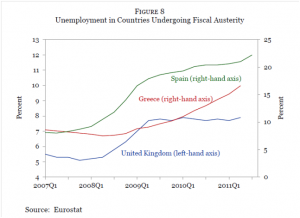 The right way to judge a policy: The metaphor I find helpful is to a patient who has been in a terrible accident and has massive internal bleeding. After life-saving surgery to stop the bleeding, the patient is likely to still feel pretty awful and will have a long way to go before he is fully healed. But that doesn’t mean the surgery didn’t work. You have to judge the effect of the surgery relative to what otherwise would have happened. Without surgery, the patient would have died. C. Romer
The right way to judge a policy: The metaphor I find helpful is to a patient who has been in a terrible accident and has massive internal bleeding. After life-saving surgery to stop the bleeding, the patient is likely to still feel pretty awful and will have a long way to go before he is fully healed. But that doesn’t mean the surgery didn’t work. You have to judge the effect of the surgery relative to what otherwise would have happened. Without surgery, the patient would have died. C. Romer
Many economists have helped feed the notion that reducing public expenditure may raise income and employment. Look at the graph. Yes, unemployment for 3 countries that followed a path of fiscal retrenchment, as argued by Christina Romer. Disastrous. Roberto Perotti, MIT Ph. D. today at Bocconi University, just came out with a paper that examines 4 cases of fiscal retrenchment and – while with some doubts – he goes on to say that this evidence “cast(s) doubt on some versions of the “expansionary fiscal consolidations” hypothesis, and on its applicability to many countries in the present circumstances”. It was time.
But these theories have left a trace, as Giuseppe Pennisi has claimed in a comment of his a few days ago on this blog. And what have the consequences been of such rushed advice to cut expenditure, so fashionable in the 90s? Less employment? Worse. Let us quote Prof. Romer: “high unemployment is not only ruining people’s lives, it may be doing permanent damage to the economy. There is some evidence that the longer high unemployment lasts, the more likely it is to become permanent. And studies show that workers who go through prolonged unemployment have lower wages and less stable employment for the rest of their careers.”
So what went wrong? “The one thing that has disillusioned me is the discussion of fiscal policy. Policymakers and far too many economists seem to be arguing from ideology rather than evidence …the evidence is stronger than it has ever been that fiscal policy matters—that fiscal stimulus helps the economy add jobs, and that reducing the budget deficit lowers growth at least in the near term. And yet, this evidence does not seem to be getting through to the legislative process. That is unacceptable. We are never going to solve our problems if we can’t agree at least on the facts.”
Economists should understand that their job is not any job. Their statements, especially when by famous leaders in the profession, matter a lot, they affect people’s lives. They should be grounded on serious research. Or else, silence is far better.
The bottom
line is that, as much as policymakers and even many economists want to believe
that doing what seems like a noble thing—lowering the budget deficit—is good
for growth in the near term, the evidence is firmly against this proposition.
Fiscal austerity may be desirable for the long-run solvency and health of the
economy. But it lowers growth and raises unemployment in the near term. That is
an essential fact that needs to inform policy decisions.

